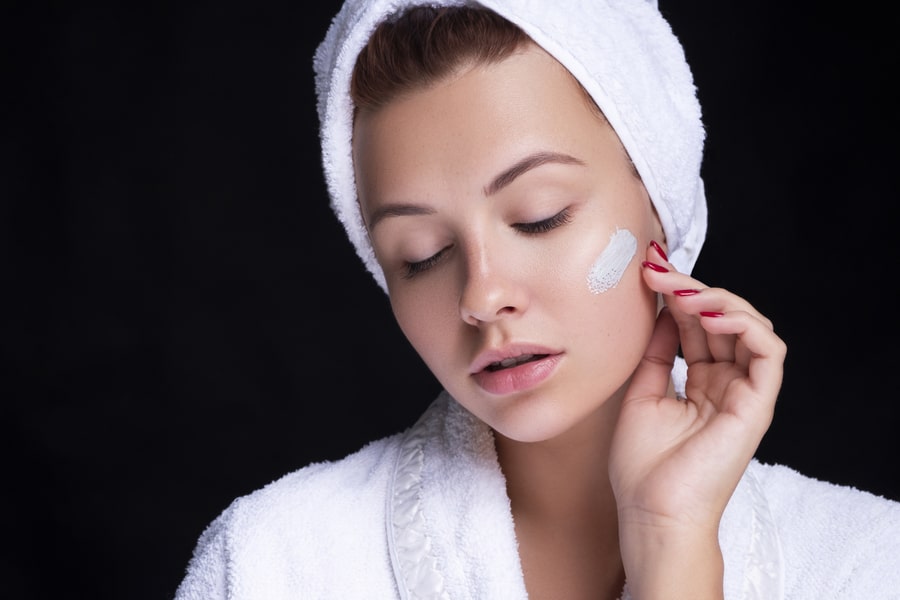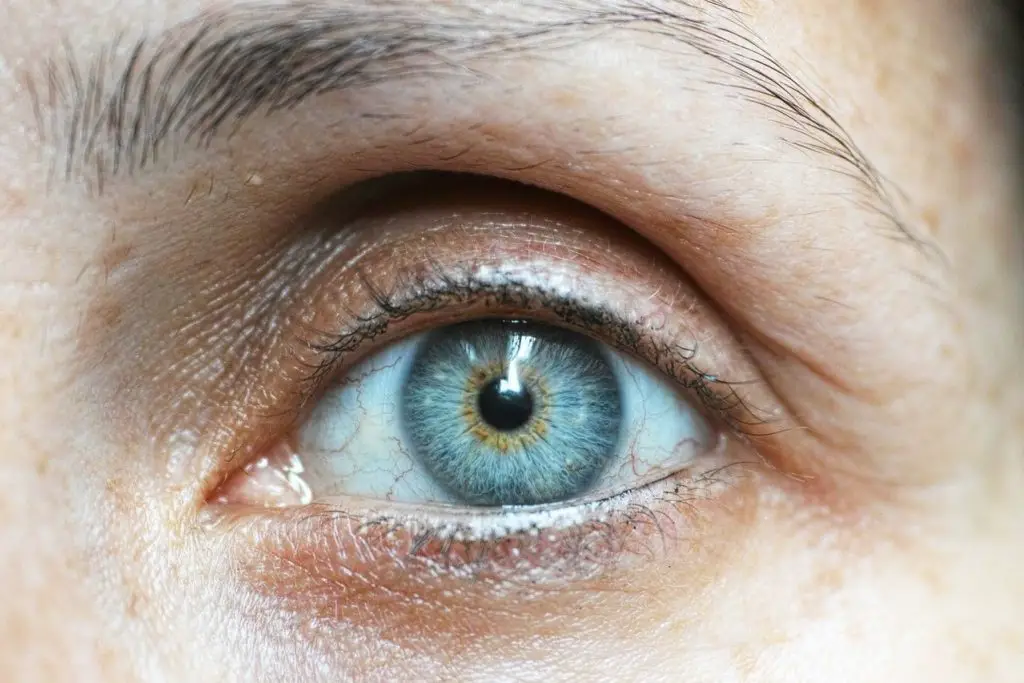Wearing sunscreen is the first thing we learn about to protect the skin. Sun damage is the best way to age faster, increase sun spots, and hyperpigmentation. And then there’s the whole risk of getting skin cancer. No thanks.
This post may contain affiliate links. Read the full disclosure here
Daily sunscreen is an essential step in any skincare routine. It’s important even if you won’t be outside the entire day. If you think you’re safe in a car, just look at what the sun did to this truck driver’s skin over time.
Most of us don’t need an extra push to wear sunscreen during the day. We know when the sun’s out, there is a risk of sun damage. Especially for those with fair skin. But what about wearing sunscreen at night. Is that a thing?
Wearing Sunscreen at Night
We didn’t know it was a thing until we saw questions popup on a popular skincare thread we follow.
It is not necessary to wear sunscreen at night. The core benefit of sunscreen is blocking UV rays that come from the sun. At night, we don’t have to worry about UV rays. With no sun, there is no need for sunscreen.

While this sounds simple, there are a few reasons why this question keeps coming up. It’s related to potentially harmful rays that come from computer screens, phones, or televisions. Also, there’s the question about using a face moisturizer that also contains SPF, or with ingredients such as retinol.
What About Protection From Blue Light?
Do we need to protect our skin from blue light? Many of us are in front of computer screens all day and check phones constantly.
There is conflicting information about the effect of blue light on the skin. Early research indicated light transmitted from screens and cell phones can damage the skin, leading to premature aging, wrinkles, and hyperpigmentation. However, other reports suggest it does not cause DNA damage or premature photo-aging.
While the research is thin, it’s a good idea to wear sunscreen during the day when in front of a computer. Some sunscreens protect the skin from blue light, but not all of them do. One study found that microfine titanium dioxide was the most effective at protecting the skin from UVA and blue light.
Using a Moisturizer with SPF at Night
What about using a daily moisturizer with SPF at night? This is an option if you don’t have access to a moisturizer that doesn’t contain SPF. This, of course, isn’t needed.
A moisturizer with SPF will contain ingredients to protect the skin from the sun. Since you won’t need this at night, it’s better to use products that don’t have unnecessary ingredients. Sunscreen moisturizers may increase the chances of clogging pores or irritating the skin. SPF moisturizers also tend to cost more.
Instead of using an SPF face lotion at night, find an alternative hydrating cream or serum. The skin is in repair mode at night. It can greatly benefit from deep moisturizers and repair products designed for the skin a night.
Applying Sunscreen After Retinol at Night
There is also confusion about wearing sunscreen with retinol-based products. Most retinol products recommend using at night. These products also recommend using sunscreen with these products. So do they mean apply sunscreen at night?

Nope. Use sunscreen the following consecutive days after using retinol. It’s a great idea to use sunscreen with retinol, but it’s not needed the night of application.
Reasons to Not Wear Sunscreen At Night
Wearing sunscreen during the night is not needed. But there are also a few key reasons why you shouldn’t be wearing SPF at night.
- May clog pores and/or make acne worse
- Putting unnecessary ingredients on the skin
- SPF products are more expensive
- Limited hydration with SPF products
- Missing out on alternative products with more benefits
Why pay more for a product that isn’t effective at night? It’s not worth it! Instead, reach or a nourishing nighttime cream or serum that can replenish hydration and nourish the skin.
Benefits of Wearing Sunscreen at Night
The core benefits of wearing sunscreen aren’t relevant at night. Sunscreen protects the skin from UV rays to help prevent sun damage, skin cancer, and premature aging. Since these benefits aren’t needed at night, neither is the SPF.
Instead, choose a product designed for nighttime use. Nourishing creams can help repair the skin at night or retinol-based products can offer powerful anti-aging benefits while sleeping.
Should You Wash Off Sunscreen at Night?
It’s good practice to wash your face in the morning and at night. This includes washing off sunscreen at night. Many sunscreen products can clog pores so it’s even more important to wash off after a fun day in the sun.
Will it be a big deal if you forget to wash off sunscreen at night? No, probably not. Daily moisturizers with SPF are often lighter weight and may not clog pores or lead to skin irritation. But it still can happen. It’s even more important to wash off sunscreen at night when struggling with acne, blemishes, or clogged pores.
However, sunscreen products include various chemical or mineral ingredients to protect the skin from the sun. Since these aren’t needed when you sleep, it’s best practice to wash these off at night.
Should I Wear Sunscreen Indoors?
So we’ve established wearing sunscreen during the night isn’t required. But what about indoors, during the day?

Sunscreen should be worn every day, even inside. UVB rays are blocked by glass but UVA rays aren’t. There is a risk of sun damage while driving in the car or at home near a window with natural light. UVA rays are also the root cause of hyperpigmentation, skin cancer, and premature aging.
What Types of Sunscreen Are Best?
Mineral-based sunscreens are a great way to go. These are considered physical sunscreens, an alternative to chemical sunscreens.
Mineral sunscreens use zinc and titanium to protect the skin from harmful UV rays. They offer a safer option for sun protection compared to chemicals. Natural sunscreens are also much better for the environment!

Chemical sunscreens contain ingredients such as oxybenzone, butylparaben, octinoxate, and 4-methylbenzylidene camphor that can be harmful to marine life.
Best Mineral Sunscreens
So you want to keep your skin protected from harmful rays during the day. You might be wondering, what’s the best mineral sunscreen to use?
Mineral sunscreen products can be tricky since they are harder to rub in compared to chemical-based alternatives.
EltaMD UV Sport Sunscreen
This full-body mineral sunscreen can protect you from head-to-toe. It uses a transparent zinc oxide formula that provides SPF 50 protection and doesn’t leave a white shadow.
It’s also fragrance-free, oil-free, and won’t clog your pores. It’s a great option for sensitive skin.
Drunk Elephant Umbra Sheer Daily Defense
The Drunk Elephant Umbra Sheer face sunscreen is another fantastic option. This mineral-based sunscreen combines marula oil, zinc oxide, thermal mud, and fruit enzymes to provide a product that protects without irritation.
The Umbra Sheer is free from fragrances, silicones, and drying alcohols. It’s another great option for sensitive skin.
CeraVe Tinted Sunscreen SPF 30, Hydrating Mineral Sunscreen
Once again, CeraVe has you covered with a high-quality and affordable option. This tinted sunscreen uses zinc oxide, titanium dioxide, essential ceramides, and hyaluronic acid to protect and hydrate the skin.
The CerVe mineral sunscreen is lightweight and fits a range of skin tones. It’s oil-free, non-comedogenic, and allergy-tested.
Related Articles You Might Like:








